
Jan 10
/
Laleska Moda
Vietnamese exports drop in 2024, while Brazilian already reached a new record
Back to main blog page
- Vietnamese coffee exports fell in 2024, reflecting lower availability in the 23/24 season and a delay in the 24/25 harvest. A reduction in planted area in 2023 and adverse weather conditions recently led to lower production, with stocks also falling to low levels.
- Producers' reluctance to sell at the end of the year likely contributed to the export trend.
- On the other hand, some analyses suggest that demand for the Vietnamese bean was also more tepid in the second half of the year, probably reflecting the increased availability and competitiveness of Brazilian conilon.
- At the same time, Brazilian exports are at record levels, partly due to the increased conilon demand in 2024. Last year's cumulative Arabica and Conilon figures are already at record levels and are likely to push 24/25 season exports to a new peak.
Vietnamese exports drop in 2024, while Brazilian already reached a new record
According to the Vietnamese government, the country's coffee exports reached 22.3 million bags in 2024, down 17.2% from 2023. This decline is likely to be a combination of several factors, including lower stocks in the 23/24 season, a delay in the 24/25 harvest, producers' reluctance to sell and possibly lower demand for the Vietnamese bean. Despite the drop in volume, it is worth noting that coffee export earnings rose by 32.5% to $5.6 billion in 2024, thanks to higher prices last year.
Despite this positive aspect, lower production and the depletion of stocks in recent harvests negatively impacted Vietnam's exports in the 23/24 season and led to a slow start to the 24/25 cycle. Cumulative exports in the 24/25 season (Oct-Dec/24) saw a 38.7% decline compared to the same period in the 23/24 season. Only 3.9 million bags were shipped in the last three months, compared to 6.4 million bags last season, with a particularly sharp decline between November and December. While we still expect a slight increase in exports this season, this will mainly reflect higher imports from origins such as Brazil, as production is still limited and the harvest delayed.
Following the decline in area and consequent production in the 23/24 season, the 24/25 cycle was hampered by dry and hot weather in early 2024, while the harvest was delayed by abundant rainfall and cyclones in the second half of 2024. In addition, producers were capitalized and waited for the beans to be more mature to start harvesting this season. As a result, the harvest only started to pick up pace in December, limiting the amount of new beans coming onto the market.
Vietnam: Coffee Exports (‘000 bags)
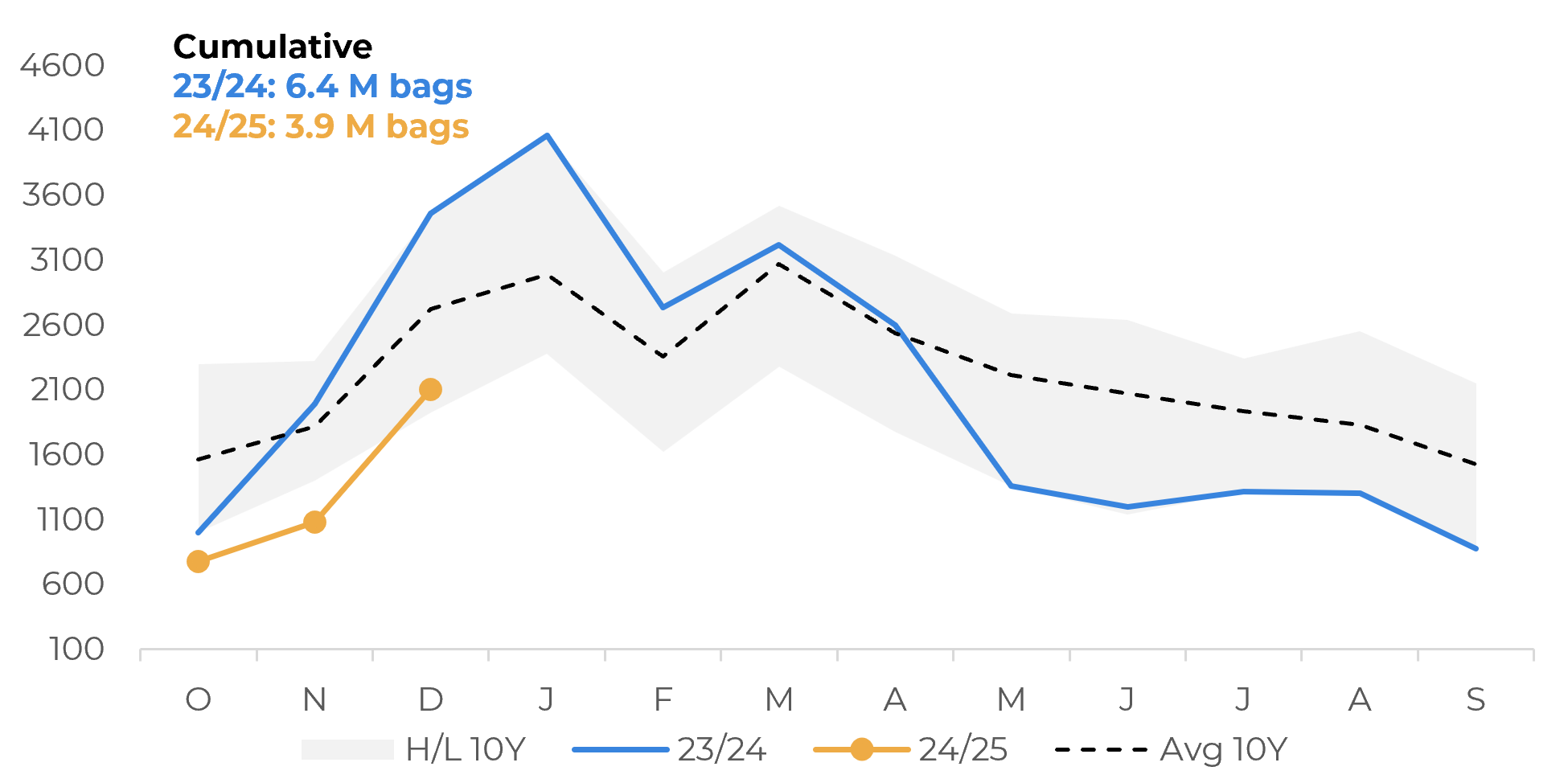
Source: Refinitiv, ICO
Vietnam: Supply and Demand for Coffee (M bags)
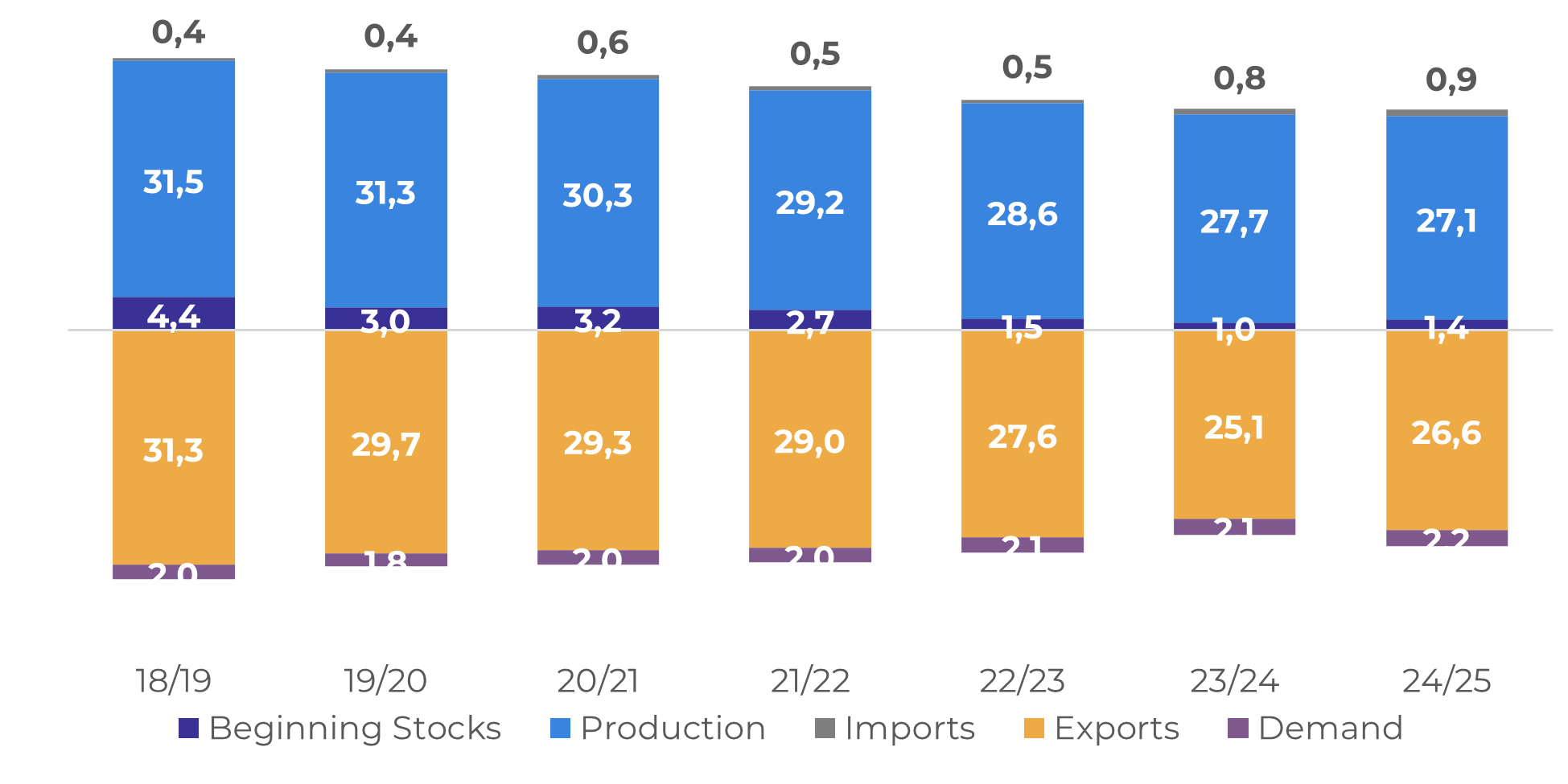
Source: Hedgepoint
However, even though field work accelerated towards the end of last year, many farmers remained reluctant to sell large volumes to the market. Not only did the holiday season affect marketing, but while prices were still high in the final weeks of the year, they remain below previous records, with many growers waiting for better prices (see also our special report on Vietnam for more information).
On the other hand, demand for Vietnamese beans was also moderate in the second half of 2024. The strong presence of Brazil's Conilon in global exports in 2024 and logistical constraints in Asia could also have had a negative impact on Vietnamese exports. According to the International Coffee Organization, traffic in the Suez Canal remains restricted, lengthening shipping times from Asian markets to European destinations and increasing costs. This also contributes to the greater competitiveness of Brazil's Conilon over Vietnam's Robusta. In addition, the depreciation of the BRL in recent months has contributed to higher export volumes of Brazilian coffee.
On the other hand, demand for Vietnamese beans was also moderate in the second half of 2024. The strong presence of Brazil's Conilon in global exports in 2024 and logistical constraints in Asia could also have had a negative impact on Vietnamese exports. According to the International Coffee Organization, traffic in the Suez Canal remains restricted, lengthening shipping times from Asian markets to European destinations and increasing costs. This also contributes to the greater competitiveness of Brazil's Conilon over Vietnam's Robusta. In addition, the depreciation of the BRL in recent months has contributed to higher export volumes of Brazilian coffee.
Vietnam: Domestic Coffee Price (VND/kg)
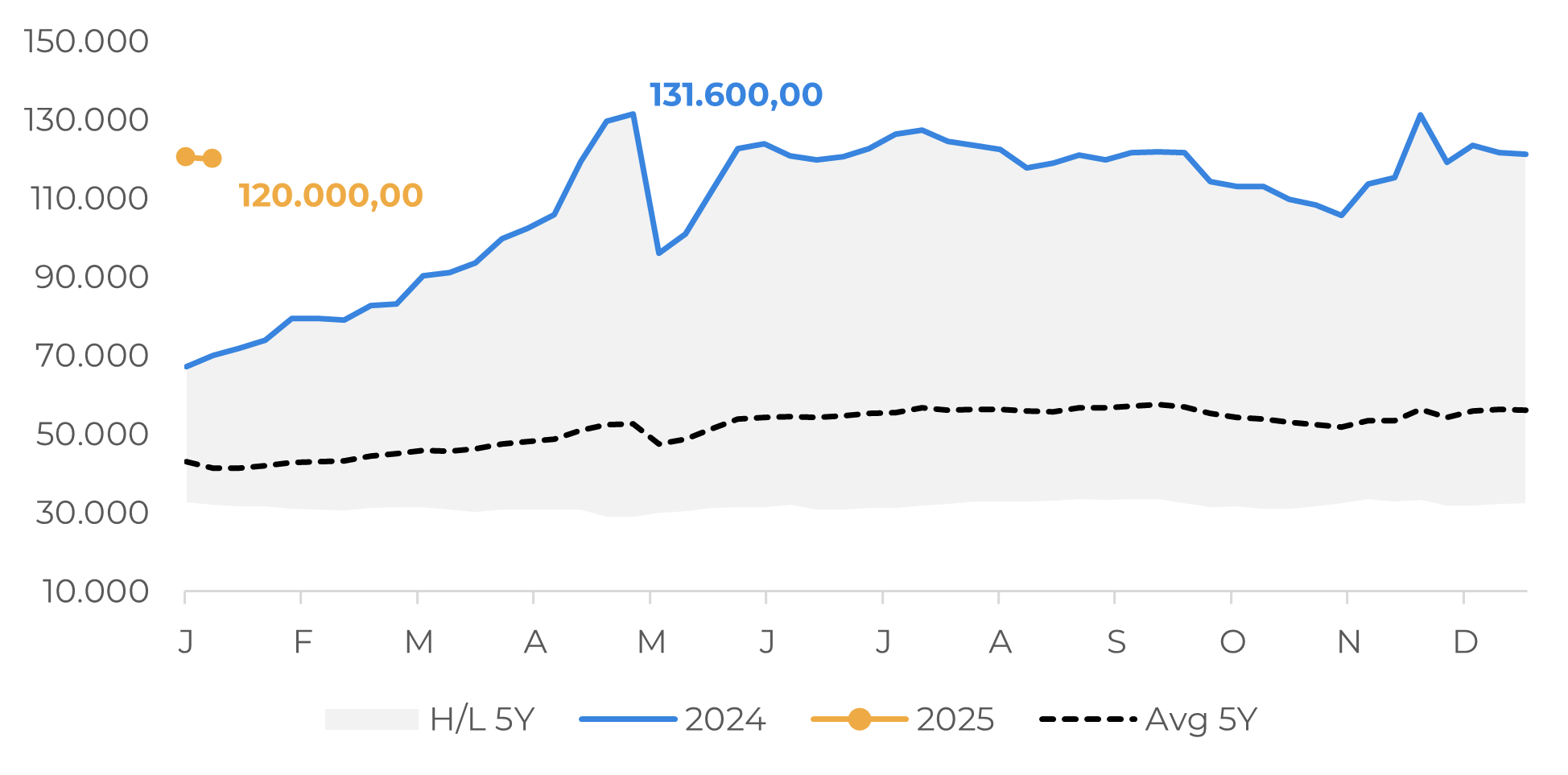
Source: Refinitiv
Brazil: Green Coffee Exports (Jan-Nov) (M bags)
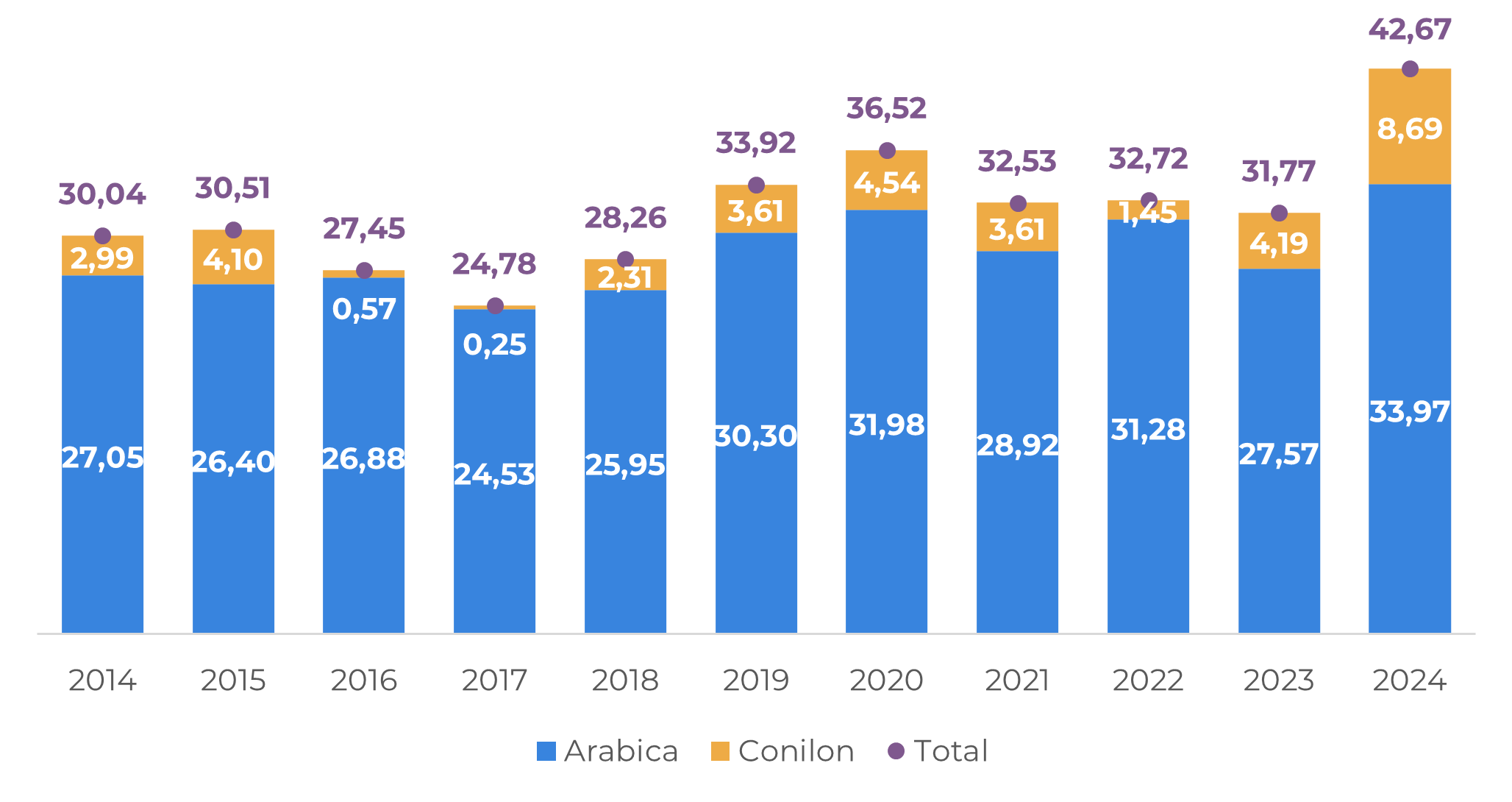
Source: Cecafé
In this scenario, it is no surprise that Brazilian coffee exports remain strong and are likely to end 2024 and the 24/25 season with a new record. According to Cecafé data, from January to November, Brazil shipped 42.67 million bags of green coffee - up 34.3% on 2023 - with Conilon already at 8.69 million bags (up 107.3% on 2023) and Arabica at 33.97 million bags (up 23.2%), both records.
The cumulative figures for 24/25 (Apr-Nov) are also already higher than for any other entire season (Apr-Mar), reflecting the change in the global coffee chain in recent years. So, while we expect Brazilian shipments to slow in the coming months - due to higher availability in Vietnam, Central America, and Colombia with the harvest in those countries and higher farmer sales in Brazil - the Brazilian 24/25 season is likely to end with record exports of conilon and arabica.
Brazil: Arabica Coffee Exports (M bags)
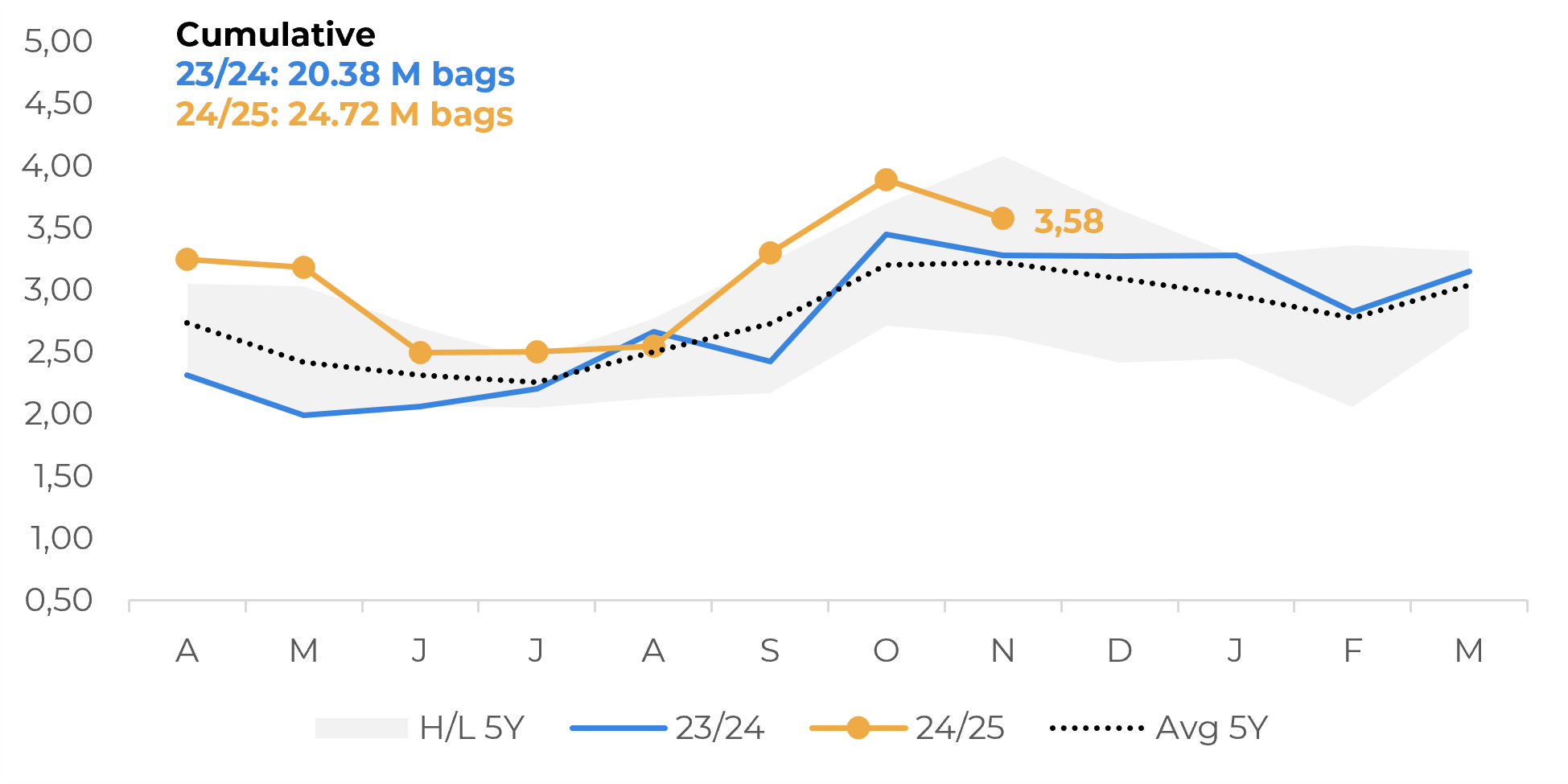
Source: Cecafé, Hedgepoint
Brazil: Conilon Coffee Exports (000’ bags)
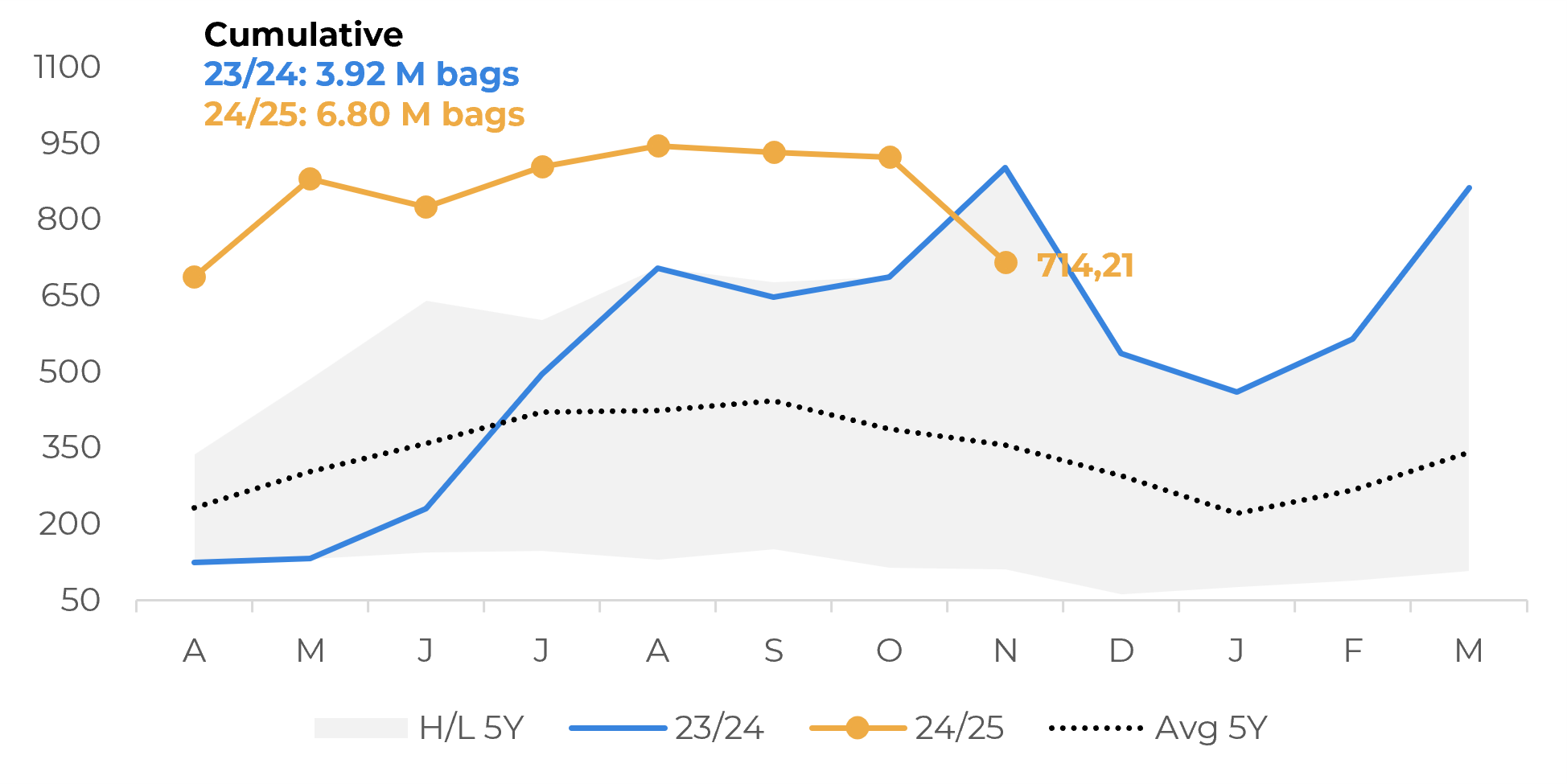
Source: Cecafé, Hedgepoint
In terms of prices, however, we still expect a more volatile and bullish scenario in early 2025, especially given the still limited global supply and the uncertainties surrounding the Brazilian 25/26 season. As mentioned above, while the availability of other origins is expected to increase in the first half of 2025, most producing countries (except for Colombia) are expected to have smaller crops in 24/25. In addition, many farmers are more capitalized and will hold their beans until a desired price is achieved.
In Brazil, while exports are heading for record levels, farmer sales were already high at the end of 2024 and stocks are likely to be at their lowest, which could also limit farmer trading volumes in 2025, at least until the start of the 25/26 season. The next cycle also points to a more limited supply: while we expect an increase in conilon production (22.6 million bags), which could prevent robusta from reaching new record prices, arabica could remain on the low side (42.6 million bags), limiting the recovery of stocks and keeping prices closer to 300 c/lb.
In Summary
A decline in production in recent cycles and lower stocks led to a drop in Vietnamese coffee exports in 2024 and a slow start to the 24/25 season. In addition, this season's harvest was also delayed by adverse weather conditions, and producers continue to show less interest in new sales than in previous seasons, waiting for higher prices.
On the other hand, Brazilian coffee exports continue to reach record levels, driven in part by higher conilon demand in 2024. While the country also faces logistical constraints, a depreciated BRL and higher costs in Asia (also driven by logistical issues) continue to highlight the greater competitiveness of the Brazilian bean relative to the Vietnamese.
Despite increasing Brazilian exports, prices should remain volatile and supported at least until the start of the 25/26 season, especially for Arabica. Not only are supplies from other origins limited, but Brazilian farmers are also likely to continue withdrawing and the likelihood of a still small Brazilian 25/26 season looms over the coffee market.
Weekly Report — Coffee
Written by Laleska Moda
laleska.moda@hedgepointglobal.com
Reviewed by Lívea Coda
livea.coda@hedgepointglobal.com
livea.coda@hedgepointglobal.com
www.hedgepointglobal.com
Disclaimer
This document has been prepared by Hedgepoint Schweiz AG and its affiliates (“Hedgepoint”) solely for informational and instructional purposes, without intending to create obligations or commitments to third parties. It is not intended to promote or solicit an offer for the sale or purchase of any securities, commodities interests, or investment products. Hedgepoint and its associates expressly disclaim any liability for the use of the information contained herein that directly or indirectly results in any kind of damages. Information is obtained from sources which we believe to be reliable, but we do not warrant or guarantee the timeliness or accuracy of this information. The trading of commodities interests, such as futures, options, and swaps, involves substantial risk of loss and may not be suitable for all investors. You should carefully consider wither such trading is suitable for you in light of your financial condition. Past performance is not necessarily indicative of future results. Customers should rely on their own independent judgment and/or consult advisors before entering into any transactions. Hedgepoint does not provide legal, tax or accounting advice and you are responsible for seeking any such advice separately. Hedgepoint Schweiz AG is organized, incorporated, and existing under the laws of Switzerland, is filiated to ARIF, the Association Romande des Intermédiaires Financiers, which is a FINMA-authorized Self-Regulatory Organization. Hedgepoint Commodities LLC is organized, incorporated, and existing under the laws of the USA, and is authorized and regulated by the Commodity Futures Trading Commission (CFTC) and a member of the National Futures Association (NFA) to act as an Introducing Broker and Commodity Trading Advisor. HedgePoint Global Markets Limited is Regulated by the Dubai Financial Services Authority. The content is directed at Professional Clients and not Retail Clients. Hedgepoint Global Markets PTE. Ltd is organized, incorporated, and existing under the laws of Singapore, exempted from obtaining a financial services license as per the Second Schedule of the Securities and Futures (Licensing and Conduct of Business) Act, by the Monetary Authority of Singapore (MAS). Hedgepoint Global Markets DTVM Ltda. is authorized and regulated in Brazil by the Central Bank of Brazil (BCB) and the Brazilian Securities Commission (CVM). Hedgepoint Serviços Ltda. is organized, incorporated, and existing under the laws of Brazil. Hedgepoint Global Markets S.A. is organized, incorporated, and existing under the laws of Uruguay. In case of questions not resolved by the first instance of customer contact (client.services@Hedgepointglobal.com), please contact internal ombudsman channel (ombudsman@hedgepointglobal.com – global or ouvidoria@hedgepointglobal.com – Brazil only) or call 0800-8788408 (Brazil only). Integrity, ethics, and transparency are values that guide our culture. To further strengthen our practices, Hedgepoint has a whistleblower channel for employees and third-parties by e-mail ethicline@hedgepointglobal.com or forms Ethic Line – Hedgepoint Global Markets. “HedgePoint” and the “HedgePoint” logo are marks for the exclusive use of HedgePoint and/or its affiliates. Use or reproduction is prohibited, unless expressly authorized by HedgePoint. Furthermore, the use of any other marks in this document has been authorized for identification purposes only. It does not, therefore, imply any rights of HedgePoint in these marks or imply endorsement, association or seal by the owners of these marks with HedgePoint or its affiliates.
Contact us
hedgepointhub.support@hedgepointglobal.com
ouvidoria@hedgepointglobal.com
Funchal Street, 418, 18º floor - Vila Olímpia São Paulo, SP, Brasil
Check our general terms and important notices.
This page has been prepared by Hedgepoint Schweiz AG and its affiliates (“Hedgepoint”) solely for informational and instructional purposes, without the purpose of instituting obligations or commitments to third parties, nor is it intended to promote an offer, or solicitation of an offer of sale or purchase relating to any securities, commodities interests or investment products. Hedgepoint and its associates expressly disclaim any use of the information contained herein that directly or indirectly result in damages or damages of any kind. Information is obtained from sources which we believe to be reliable, but we do not warrant or guarantee the timeliness or accuracy of this information. The trading of commodities interests such as futures, options, and swaps involves substantial risk of loss and may not be suitable for all investors. You should carefully consider wither such trading is suitable for you in light of your financial condition. Past performance is not necessarily indicative of future results. Customers should rely on their own independent judgement and/or advisors before entering in any transaction.Hedgepoint does not provide legal, tax or accounting advice and you are responsible for seeking any such advice separately.Hedgepoint Schweiz AG is organized, incorporated, and existing under the laws of Switzerland, is filiated to ARIF, the Association Romande des Intermédiaires Financiers, which is a FINMA-authorized Self-Regulatory Organization. Hedgepoint Commodities LLC is organized, incorporated, and existing under the laws of the USA, and is authorized and regulated by the Commodity Futures Trading Commission (CFTC) and a member of the National Futures Association (NFA) to act as an Introducing Broker and Commodity Trading Advisor. HedgePoint Global Markets Limited is Regulated by the Dubai Financial Services Authority. The content is directed at Professional Clients and not Retail Clients. Hedgepoint Global Markets PTE. Ltd is organized, incorporated, and existing under the laws of Singapore, exempted from obtaining a financial services license as per the Second Schedule of the Securities and Futures (Licensing and Conduct of Business) Act, by the Monetary Authority of Singapore (MAS). Hedgepoint Global Markets DTVM Ltda. is authorized and regulated in Brazil by the Central Bank of Brazil (BCB) and the Brazilian Securities Commission (CVM). Hedgepoint Serviços Ltda. is organized, incorporated, and existing under the laws of Brazil. Hedgepoint Global Markets S.A. is organized, incorporated, and existing under the laws of Uruguay. In case of questions not resolved by the first instance of customer contact (client.services@Hedgepointglobal.com), please contact internal ombudsman channel (ombudsman@hedgepointglobal.com – global or ouvidoria@hedgepointglobal.com – Brazil only) or call 0800-8788408 (Brazil only).Integrity, ethics, and transparency are values that guide our culture. To further strengthen our practices, Hedgepoint has a whistleblower channel for employees and third-parties by e-mail ethicline@hedgepointglobal.com or forms Ethic Line – Hedgepoint Global Markets.Security note: All contacts with customers and partners are conducted exclusively through our domain @hedgepointglobal.com. Do not accept any information, bills, statements or requests from different domains and pay special attention to any variations in letters or spelling, as they may indicate a fraudulent situation.“HedgePoint” and the “HedgePoint” logo are marks for the exclusive use of HedgePoint and/or its affiliates. Use or reproduction is prohibited, unless expressly authorized by HedgePoint. Furthermore, the use of any other marks in this document has been authorized for identification purposes only. It does not, therefore, imply any rights of HedgePoint in these marks or imply endorsement, association or seal by the owners of these marks with HedgePoint or its affiliates.
We have updated our Terms & Conditions to reflect improvements to our platform, data handling practices, and the overall experience we provide to our clients.
To continue using the Hedgepoint HUB, please review and accept the updated terms.

